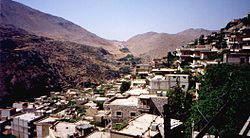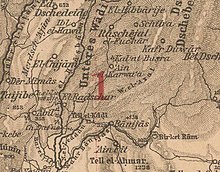Shebaa (Arabic: شبعا, French: Chebaa) is a town on the south-eastern tip of Lebanon. It has a largely Sunni Muslim population of 25,000 people. It is situated at an altitude of approximately 1,700 m (5,600 ft) above sea level, spreading across two steep rocky mountainsides.[1] It lies adjacent to the contested Shebaa farms—which sit between the town and the Golan Heights.[2] Before 1967, residents of Shebaa farmed in the disputed Shebaa farms territory.[3]
Shebaa
شبعا | |
|---|---|
Village | |
 Shebaa, in 1998 | |
| Coordinates: 33°20′55″N 35°44′55″E / 33.34861°N 35.74861°E | |
| Country | |
| Governorate | Nabatieh Governorate |
| District | Hasbaya District |
| Time zone | UTC+2 (EET) |
| • Summer (DST) | UTC+3 (EEST) |
| Dialing code | +961 |

History
editIn 1838, Eli Smith noted Shebaa's population as being Sunni Muslim and Greek Orthodox Christians.[5]
Following the 1982 Lebanon War, Shebaa became part of Israel’s security zone with Norwegian soldiers from UNIFIL stationed in the area. On one night in late January 1989, the Israeli backed SLA expelled 40 villagers, ordering them not to return. This brought the total over a period of several months to around 80. In the words of the UNIFIL spokesperson those expelled were “mostly women and children”. There was outrage when a Norwegian colonel compared IDF actions to those of the Nazis.[6] Israel withdrew from South Lebanon, including the town of Shebaa, in 2000.
As of 2015, the town housed several thousand Syrian refugees.[7]
Demographics
editIn 2014 Muslims made up 96.96% and Christians made up 2.89% of registered voters in Shebaa. 92.99% of the voters were Sunni Muslims. The Christian population is mostly Greek Orthodox.[8]
Educational establishments
edit| Educational establishments | Chebaa (Hasbaiya) (2005–2006) | Lebanon (2005–2006) |
|---|---|---|
| Number of schools | 4 | 2788 |
| Public schools | 2 | 1763 |
| Private schools | 2 | 1025 |
| Students in public schools | 435 | 439905 |
| Students in private schools | 145 | 471409 |
References
edit- ^ Nour Samaha (2 Jul 2013). "The strange case of Lebanon's Shebaa". Al Jazeera. Retrieved 12 June 2015.
- ^ Saady Wiegand (2011). Enduring Territorial Disputes: Strategies of Bargaining, Coercive Diplomacy, and Settlement (illustrated ed.). University of Georgia Press. p. 146. ISBN 9780820337388.
- ^ Krista Eileen Wiegand (2011). Enduring Territorial Disputes: Strategies of Bargaining, Coercive Diplomacy, and Settlement (illustrated ed.). University of Georgia Press. pp. 157–8. ISBN 9780820337388.
- ^ Wilson, 1881, vol 2, p. 129
- ^ Robinson and Smith, 1841, vol 3, 2nd appendix, p. 138
- ^ Middle East International No 346, 17 March 1989, Publishers Lord Mayhew, Dennis Walters MP; Jim Muir p.8
- ^ Samya Kullab; Ghinwa Obeid (27 Feb 2015). "Shebaa, the town caught in the middle". The Daily Star. Retrieved 12 June 2015.
- ^ "التوزيع حسب المذاهب للناخبين/ناخبات في بلدة شبعا، قضاء حاصبيا محافظة النبطية في لبنان". إعْرَفْ لبنان. Retrieved 2024-11-04.
Bibliography
edit- Robinson, E.; Smith, E. (1841). Biblical Researches in Palestine, Mount Sinai and Arabia Petraea: A Journal of Travels in the year 1838. Vol. 3. Boston: Crocker & Brewster.
- Wilson, C.W., ed. (c. 1881). Picturesque Palestine, Sinai and Egypt. Vol. 2. New York: D. Appleton.
External links
edit- Localliban: Centre de resource sur le developpement local: www.localiban.org
